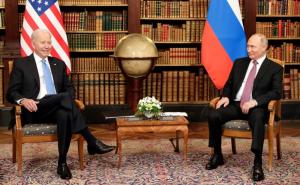 Are we going to Russia now? The Cursing has begun.
Are we going to Russia now? The Cursing has begun.
On Saint Patrick’s Day 2022, President Joe Biden began to curse Vladimir Putin. He referred to the Russian leader as a “war criminal,” a murderous dictator,” and a “pure thug.”
Does this mark the crossing of a threshold? The U.S. president to date has avoided cursing the Russian president, and has assiduously avoided any military contact. I had predicted that America would not plan military engagement because America had not yet begun cursing. Now, America is cursing. What does this portend?
Previous Post: Are we going to war with Russia?
Are we in the U.S. and NATO going to war with Russia over the Ukraine crisis? When you begin to hear President Joe Biden curse President Vladimir Putin, then war will be nigh.
We have not yet heard President Biden curse President Putin. So, war with Russia is not nigh. Should we breathe a sigh?
Why do I think this? Here’s my argument.
Proposition One. When an individual commits premeditated murder, the killer curses before killing.
Proposition Two. When a U.S. president plans to invade a foreign country, he (or she) curses the enemy in advance.
Proposition Three. To date, we have not heard President Biden curse President Putin.
Conclusion. Therefore, President Biden earnestly wants to avoid war with Russia.
First. When one person commits premeditated murder, the killer curses before killing.
According to sociologist Jack Katz who has interviewed numerous killers, what he observes about cursing is astonishing. The passionate aggression that immediately precedes the thrusting of the knife or the pulling of the trigger yields a verbal denunciation of the victim. The victim is described as a “bitch,” a “whore,” a “bastard,” a “nickel-and-dime-drunk.” Most frequently the victim is associated with excrement, what we would otherwise flush down the toilet. “This is the spiritual beauty of rage,” comments Katz (Jack Katz, Seductions of Crime. NY: Basic, 1988, 31).
Let’s take a look at cursing in light of the Christian understanding of Sin. In previous Patheos column posts, I’ve noted repeatedly that you and I exact violence against others in the name of the good. In our own misguided minds, we draw a line between good and evil. We place ourselves on the good side of the line. This is called, self-justification. On the evil side of the line we place our enemy. This is called, scapegoating. We feel justified at perpetrating violence against our selected victim on the grounds that the victim is not good.
Verbal cursing helps us to convince ourselves that the victim of our scapegoating is evil while we are good. The victim deserves our violence. We are exacting justice. We should be congratulated when we murder someone who is the equivalent of excrement.
You and I as sinners perpetrate evil only in the name of the good. Those who commit murder, at some level, believe they are doing a good thing. Well, most of the time.
Second. When a U.S. president plans to invade a foreign country, he (or she) curses the enemy in advance.
Presidents curse on the eve of war. Typically, a president trying to drum up mob passion will identify the enemy as Hitler-like. Americans can justify bombing with “shock and awe” if, once again, Americans are fighting the evils of Nazism. President Lyndon Johnson cursed the North Vietnamese with the “Hitler” appellation in 1965. President Bill Clinton used the “Hitler” curse again to justify the NATO bombing of Kosovo in 1999.
 When the senior George Bush wanted to invade Iraq, he deliberately mispronounced the name, Saddam Hussein. He claimed that Saddam Hussein was as evil as Hitler. The world would be better off without this person who is as evil as Hitler. When U.S. troops captured the Iraqi oil fields, then the president backed off and allowed Saddam Hussein to continue in power. Once the petroleum was secured, Saddam Hussein was not longer called Hitler.
When the senior George Bush wanted to invade Iraq, he deliberately mispronounced the name, Saddam Hussein. He claimed that Saddam Hussein was as evil as Hitler. The world would be better off without this person who is as evil as Hitler. When U.S. troops captured the Iraqi oil fields, then the president backed off and allowed Saddam Hussein to continue in power. Once the petroleum was secured, Saddam Hussein was not longer called Hitler.
When the junior George Bush took his turn at invading Iraq, he described Saddam Hussein as belonging to the axis of evil. America would do the world a favor by ridding us of the axis of evil.
Hitler and Nazi cursing is already rife outside the White House, as I point out in a previous post, “Nazi cursing of, and by, Russia.” If you hear President Biden begin comparing any foreign adversary to Adolf Hitler, it’s time to head for the bomb shelter.
Third. To date, we have not heard President Biden curse President Putin.
Just what has President Joe Biden said? He warned that President Putin would pay a “heavy price” should he invade Ukraine.
Just what has President Biden not said? He has not compared Putin to Hitler. He has not compared Putin to excrement.
If war is averted, Presidents Biden and Putin may be able to pursue future diplomatic relations with mutual respect.
Conclusion. Therefore, President Biden earnestly wants to avoid war with Russia.
We need not rush to our bomb shelters quite yet. As long as we hear no cursing from the mouth of Joe Biden, we have good reason to hope for a peaceful resolution to the Ukraine crisis.
Are theological propositions testable?

This is an exercise in public theology. I have sought to draw upon the resources of the Christian understanding of sin in order to interpret the present political situation and to anticipate what might come in the near future. If we do not hear cursing from Washington, I forecast that we will not see the US and NATO go to war with Russia. Is my forecast reliable? If not, will you ever pay attention to a public theologian again? [Heart Earth by Madi, Bali]
My Berkeley colleague, Robert John Russell, founder and direction of the Center for Theology and the Natural Sciences, distinguishes scientific propositions from theological propositions.
A scientific proposition or hypothesis can be confirmed or disconfirmed through empirical experiment. Because theological propositions are interpretations of Biblical symbols, they cannot be similarly confirmed or disconfirmed. Professor Russell is looking for a theologian courageous enough to offer testable propositions.
So, how might Professor Russell’s challenge apply in this instance? I have sought to interpret the Bible’s understanding of sin in terms of self-justification and scapegoating. On this basis, I believe I can forecast that–when a U.S. president curses the enemy–war is nigh. Might my theological forecast be confirmable or disconformable?
I hope I don’t have to find out.
▓
 Ted Peters is a Lutheran pastor and emeritus seminary professor. His one volume systematic theology is now in its 3rd edition, God—The World’s Future (Fortress 2015). He has undertaken a thorough examination of the sin-and-grace dialectic in two works, Sin: Radical Evil in Soul and Society (Eerdmans 1994) and Sin Boldly! (Fortress 2015). Watch for his forthcoming, The Voice of Public Christian Theology (ATF 2022). See his website: TedsTimelyTake.com.
Ted Peters is a Lutheran pastor and emeritus seminary professor. His one volume systematic theology is now in its 3rd edition, God—The World’s Future (Fortress 2015). He has undertaken a thorough examination of the sin-and-grace dialectic in two works, Sin: Radical Evil in Soul and Society (Eerdmans 1994) and Sin Boldly! (Fortress 2015). Watch for his forthcoming, The Voice of Public Christian Theology (ATF 2022). See his website: TedsTimelyTake.com.
▓














